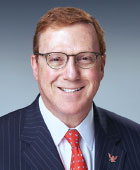Reflecting on Our Legacy as We Move Into the Future
Abstract

The APA Annual Meeting returns this year to Philadelphia, where in 1844 13 medical leaders of the nation’s psychiatric hospitals gathered for a meeting that would mark the beginning of our Association. Their drive and compassion helped lead to more compassionate and effective care and gave rise to the APA we know today.
This Annual Meeting marks the end of a year of celebrating APA’s founding and reflecting on what the past 175 years of American psychiatry has meant to patients and psychiatrists at home and abroad. Understanding the link between the history of our profession and the present is key to determining a strong future for APA and our profession.
It is incredible to think of how far psychiatry has come as a medical specialty since the humble beginnings of our Association in the 19th century. This growth is evidenced in the Annual Meeting, which has evolved from a small gathering in a single room to the preeminent psychiatric event of the year, with thousands of psychiatrists from all over the world participating in hundreds of scientific sessions. Whenever I attend the Annual Meeting, I come away feeling that the future of psychiatry is bright. So much new research and information on issues that impact the field and our patients are shared with the world at our meeting, and it is inspiring to see the ways that our members are creating, innovating, and improving treatment to deliver the highest quality care and keep pace with a rapidly changing health care landscape.
Digital resources have increased our access to education and our ability to communicate with colleagues more easily and frequently, but on their own they cannot replace the unique experience of the Annual Meeting. The opportunities for networking, face-to-face interaction with experts, and reconnecting with old friends are some of the reasons why I look forward to the meeting each year.
One of the major points on which I reflected in the past year was the spirit of collaboration and innovation that brought the 13 founders of APA together in 1844. It pleases me to say that their legacy lives on in the work our members do each day despite the numerous obstacles they face. As we enter a new decade, I know that our members will harness this spirit and continue to put in the hard work needed to address the major issues affecting our patients and profession, like the disparities in treatment for members of minority/underrepresented groups, high incarceration rates for people with mental illness, barriers that prevent people from accessing care, the opioid crisis, the need for more research funding, and stigma.
I hope you’ll join me in April as we gather in the city that was central to the rise of American psychiatry and APA itself and forge ahead into the future as medical leaders for the mind, brain, and body. ■



